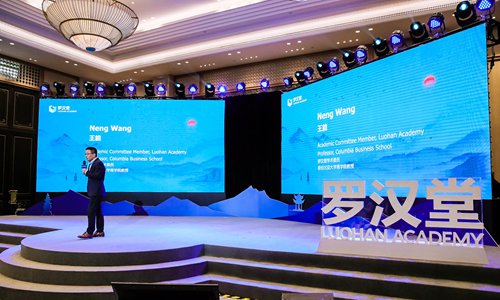HOME >> BUSINESS
Whole-of-society effort drives technology development in China
By Xie Jun in Hangzhou Source:Global Times Published: 2019/6/25 21:53:40

Wang Neng, a professor at Columbia Business School, delivers a speech during a discussion panel at Alibaba's Luohan Academy in Hangzhou, East China's Zhejiang Province on Tuesday. Photo: Xie Jun/GT
China is pushing forward technological revolution at all levels, from government support and corporate participation to academic exchanges and conversations among ordinary people, underscoring an exceptional phenomenon where the entire country is immersed in technical breakthroughs amid a trade and technology war with the US.
On Tuesday, Alibaba's open research institute - the Luohan Academy - summoned more than 200 entrepreneurs, academics including several Nobel Prize winners and politicians to discuss the 10 most critical questions about the digital economy.
Some of those questions relate to people's concerns about high technologies such as whether digital technologies would widen social gap or cut human jobs. There were also discussions about whether people should first embrace digital technology or control risks.
Discussions like this reflect the Chinese people's passion, from theory to practice, for technical improvement, experts said.
"There is a change in the way Chinese people approach technologies. In the past, when business people talked about technologies, they were talking about concepts or showing off. Now everyone is talking about application. Because of the application of technologies, ordinary people 'feel' and 'use' technologies to a greater extent, and this has pushed them to get involved in such discussions," Liu Dingding, an independent technology analyst, told the Global Times on Tuesday.
According to Liu, this is happening in China for many reasons. First, the Chinese government is encouraging technical breakthroughs, particularly in some of what he called "crux technologies" like operating systems and chips.
On Monday, Vice Premier Liu He visited the Chinese Academy of Sciences (CAS). Liu said that the CAS should strengthen breakthroughs in core technologies and pursue scientific cooperation with developed countries.
A report published by the Luohan Academy on Tuesday pointed out that the Chinese government has been "particularly successful" in allowing entrepreneurs to experiment and grow, providing support such as creating a benign regulatory environment, efficient infrastructure and local support.
Because of the gradually embedded digital social environment where the government is supportive and the mass population is open-minded, high-technology businesses are thriving in China, not only benefiting from the nation's technical ecosystem but also contributing to it.
Two executives from Chinese technology start-ups delivered speeches at the Luohan Academy's discussion sessions on Tuesday morning. Yang Lei, CEO of bike-sharing company Hellobike, talked about how his company used artificial intelligence in vehicle scheduling at a very early stage, which made his company stand out as many start-ups were still using human labor to carry out such missions.
Yang stressed that such technical exploration was impossible but for China's rapid development in basic intelligent hardware.
"In China, many technologies are already there, so we can develop our own technologies on the basis of them. In some other countries, where the digital ecosystem has not formed ... for example, few people use mobile payments ... you have to start everything from scratch and that's too difficult," he told the Global Times on the sidelines of the discussion.
Liu Dingding observed that in recent years, more and more companies involved in advanced technology had sprung up in China. "Apart from the technology giants such as (Baidu, Alibaba and Tencent), there are also many 'small technology giants' in vertical fields like SenseTime," he said.
"This is definitely encouraging as China wants to strengthen its economy via technological and scientific reforms, instead of via real estate or financial speculation," he said.
Posted in: INDUSTRIES,COMPANIES